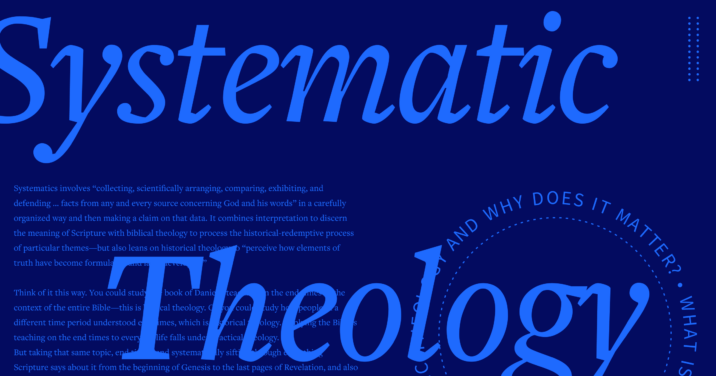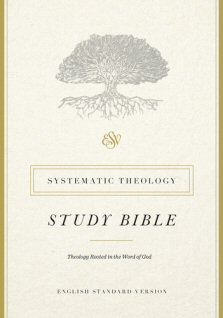Systematic theology might sound like a topic better left to the pros, like pastors and teachers. And the average Christian’s attitude toward God and the study of Scripture seems to reflect this. A LifeWay study revealed that only 32 percent of Christians read their Bible every day, and 12 percent said they rarely read it, if ever.1 And that’s just reading the Word, not studying it.
Yet Scripture calls all believers to search the Scriptures (Acts 17:11) and to rightly handle the Word of truth (2 Tim 2:15).
One way to do this is through what’s called “systematic theology.” Those two words might sound intimidating, but when broken down, it’s really quite simple—and it could dramatically change your perspective of how perfectly God has knitted together his Word from beginning to end.
Contents
- What does systematic theology mean?
- Areas of systematic theology
- Why Christians should study systematic theology
- Is systematic theology beneficial?
- How to start studying systematic theology
- Systematic theology FAQ
What does systematic theology mean?
Let’s first define theology. The word “theology” comes from two words: theos, meaning “God,” and logos, meaning “word” or “discourse”—thus, discourse about God.2
There are several types of theologies, and each has its purpose and place in the study of God. (Below is a brief summary of each, but a more exhaustive explanation follows in the FAQ section.)
- Biblical theology identifies distinctive themes in various sections of the Bible, like the Old Testament or Paul’s writings, and traces them from one section to another to discover unifying themes that tie the whole Bible together.3
- Historical theology is the study of theology’s unfolding throughout the centuries and how Christians have understood theological topics in different periods.
But systematic theology is unique. It centers on studying the entire scope of the Bible, gathering everything Scripture teaches about a particular topic or issue.
Lexham Bible Dictionary defines this type of theology as:
An approach to the Bible that seeks to draw biblical teachings and themes into a self-consistent, coherent whole, in conversation with the history of Christian theological reflection and contemporary issues confronting the church. This is distinct from—yet related to—the approach of biblical theology, which focuses on the development of theological themes within individual books of the Bible or across one or both Testaments. The practice of biblical theology is often more closely intertwined with the practice of biblical studies, whereas systematic theology is usually viewed as a discipline that goes beyond the scope of biblical studies into church history, philosophy, and pastoral application.4
Systematics involves “collecting, scientifically arranging, comparing, exhibiting, and defending … facts from any and every source concerning God and his words”5 in a carefully organized way6 and then making a claim on that data. It combines interpretation to discern the meaning of Scripture with biblical theology to process the historical-redemptive process of particular themes—but also leans on historical theology to “perceive how elements of truth have become formulated and later developed.”7
Think of it this way. You could study the book of Daniel’s teaching on the end times in the context of the entire Bible—this is biblical theology. Or you could study how people in a different time period understood end times, which is historical theology. Applying the Bible’s teaching on the end times to everyday life falls under practical theology.
But taking that same topic, end times, and systematically sifting through everything Scripture says about it from the beginning of Genesis to the last pages of Revelation, and also considering church history, philosophy, and life application—that’s systematic theology.
See how Dr. C. Gary Barnes defines and describes systematics in his “Pastoral Counseling: Foundations and Practices” course:
See how Logos can help you learn more about
other theological topics.
Areas of systematic theology
Systematics is broken down into several categories or “doctrines”8—what the whole Bible teaches about a particular topic. Andrew Naselli, assistant professor of New Testament and biblical theology at Bethlehem College and Seminary, suggests ten doctrines that are the “big headings under which most systematic theology fits”:9
- Theology proper (the doctrine of God)
- Bibliology (the doctrine of the Bible)
- Angelology (the doctrine of angels and demons)
- Anthropology (the doctrine of humanity)
- Hamartiology (the doctrine of sin)
- Christology (the doctrine of Christ)
- Soteriology (the doctrine of salvation)
- Pneumatology (the doctrine of the Holy Spirit)
- Ecclesiology (the doctrine of the church)
- Eschatology (the doctrine of the end times)
Each is a key doctrine in the history of the church and important for believers across all time, and most have many subcategories. For example, Christology covers Jesus’s birth, life, death, resurrection, and ascension, as well as his deity, humanity, all the Old Testament prophecies about him, and his return to earth and reign. It answers some of the big questions about Jesus, like Is Jesus God? and How can Jesus be both God and man?
Studying each doctrine is like one piece of a jigsaw puzzle that helps to complete a beautiful picture. As you better understand each doctrine and put it together with the rest, it begins to give you a more complete picture of God and his perfect plan of redemption.
Why should Christians study systematic theology?
In his acclaimed work Systematic Theology, Wayne Grudem offers several reasons Christians should study systematics—but says the most basic is that Jesus commands it.10
Just before ascending to heaven, Jesus instructed his disciples (and now us) to:
Go therefore and make disciples of all nations, baptizing them in the name of the Father and of the Son and of the Holy Spirit, teaching them to observe all that I have commanded you; and lo, I am with you always, to the close of the age. (Matt 28:19–20; emphasis mine)
To teach all that Jesus commanded means “to teach the content of the oral teaching of Jesus as it is recorded in the gospel narratives.”11 However, in a broader sense, Grudem says:
“All that Jesus commanded” includes the interpretation and application of his life and teachings, because in the book of Acts, it is implied that it contains a narrative of what Jesus continued to do and teach through the apostles after his resurrection (note that [Acts] 1:1 speaks of “all that Jesus began to do and teach”). Thus in a larger sense, “all that Jesus commanded” includes all of the New Testament.
Furthermore, when we consider that the New Testament writings endorse the absolute confidence Jesus had in the authority and reliability of the Old Testament Scriptures as God’s words (see chapter 4), and when we realize that the New Testament epistles also endorse this view of the Old Testament as absolutely authoritative words of God, then it becomes evident that we cannot teach “all that Jesus commanded” without including all of the Old Testament (rightly understood in the various ways in which it applies to the new covenant age in the history of redemption) as well.12
And for Grudem, the best way to teach ourselves and others what the whole Bible says is to do so systematically—by gathering and organizing all Scripture passages on particular biblical topics.
Is systematic theology beneficial?
You might be thinking, Is there a practical reason to study the Bible this way? Grudem says yes and offers two benefits:
- It helps guard us against imposing our ideas on Scripture. Because we’re human (and sinners), we’re apt to find some biblical teachings hard to embrace. The study of systematics helps us overcome wayward ideas about God, the world he created, and his law that ought to govern our lives.
- It helps us answer questions that arise over future doctrinal controversies. There’s no way to know what new doctrinal issues could surface in our lifetime.
How to start studying systematic theology
Studying systematics isn’t only for seminary students. In fact, if you’ve ever told someone, “Scripture says the Holy Spirit is …” you’re applying it already—you just might not have known it.
If this is a new step for you, we suggest starting with these ideas.
1. Tap into systematic theology resources
You can start by picking up a resource like the ESV Systematic Theology Study Bible. Or you might explore one category of systematics—like soteriology in Sojourners and Strangers: The Doctrine of the Church or pneumatology in He Who Gives Life: The Doctrine of the Holy Spirit.
To study systematics more in-depth, consider a resource like Wayne Grudem’s Systematic Theology (2nd ed.). Tim Challies calls this “an ideal textbook” for its “lucidity and simplicity.” It’s suitable for any believer, whether you’re a longtime systematics fan or just beginning to dabble in it.
Or you could take a Logos Mobile Ed course on a particular doctrine of interest with trusted scholars, like “Christology: Prominent Titles for Jesus,” or this one on different perspectives on the doctrine of eschatology.
Other great books on the subject include Louis Berkhof’s succinct, clear, and well-organized Systematic Theology. Or for a more exhaustive treatment of the subject, consider Normal L. Geisler’s Systematic Theology (4 vols.).
Charles Hodge’s Systematic Theology (3 vols.) is noted for its clear writing and thorough scholarship from a Reformed tradition. And Systematic Theology: An Introduction to Christian Belief by John Frame shows how the Bible explains God’s sweeping plan for mankind with clear and practical language accessible for both pastor and layperson.
Recommended systematic theology resources
Systematic Theology: An Introduction to Biblical Doctrine, 2nd ed.
Regular price: $47.99
2. Use Bible software
Today, we’ve got technology at our fingertips that makes the study of systematic theology easy. (And the people rejoiced!) For example, the Passage Guide in Logos13 shows you every place where systematics resources in your Logos library reference a biblical passage and then filters the results by sub-discipline and even denominational affiliation.
Systematic theology FAQ
What is an example of systematic theology?
One example of systematics is eschatology (the study of the end times). Systematics takes all the information about the end times from every book in the Bible and organizes it into a categorical “system.”
What is the difference between biblical and systematic theology?
According to Lexham Bible Dictionary, “While systematic theology looks to the Bible for theological information concerning a topic of contemporary significance, biblical theology addresses unifying themes in the historical context of the text.”
What is a systematic theology study Bible?
These study Bibles help readers understand how Scripture forms the basis for our understanding of God, humanity, sin, salvation, eternity, and more. For example, the ESV Systematic Theology Study Bible features over four hundred short in-text doctrinal summaries connecting Christian beliefs to specific Bible passages, twenty-five longer articles explaining important theological topics in greater depth, and introductions to each book of the Bible that highlight the unique ways each book contributes to the whole of Christian theology.
Who was the father of systematic theology?
Bartholomäus Keckermann (1572–1609) was the first person to use the term “systematic theology,” but the idea was not new. According to Paul, the Bereans practiced systematic theology by “examining the Scriptures daily to see if these things were so” (Acts 17:11). It is widely accepted that the early church fathers, like Origen, were systematicians.
What are the 4 types of theology?
There are four types of theology:
1. Biblical theology
“Biblical theology seeks to understand the theological coherence and unity of the diverse literature of the Bible. Biblical theologians recognize the authoritative role of the biblical canon within the church. The historical orientation of biblical theology separates it from the field of systematics. Biblical theology approaches the biblical text in its historical and literary setting, highlighting the text’s meaning to its original audience. Biblical theologians seek to interpret individual passages or books within the greater framework of redemptive history. Biblical theologies often address the major theological topics of creation, fall, redemption, and glorification.”14
2. Historical theology
In his course “New Testament Exegesis and Theologians,” David Naselli defines historical theology:
Historical theology surveys and evaluates how significant exegetes and theologians have understood the Bible and theology. How has Christian doctrine developed? How has it responded to false teaching? In order to understand historical theology, you have to understand its historical context—that’s church history.
So historical theology typically focuses on four main periods in church history:
- The early church (first century–600)
- Medieval period (about 600–1500)
- Reformation and post-Reformation (about 1500–1750)
- Modern period (about 1750–the present)
3. Systematic theology
Below are four quotes from theologians defining systematics:
“The science of God and of the relations between God and the universe.”
—A. H. Strong
“To systematize the facts of the Bible and ascertain the principles or general truths [that] those facts involve.”
—Charles Hodge
“A science that is concerned with both the Infinite and the Finite, with both God and the Universe. The material, therefore, which it includes, is vaster than that of any other science. It is also the most necessary of all the sciences.”
—W. G. T. Shedd
“A science [that] follows a humanly devised scheme or order of doctrinal development and which purports to incorporate into its system all the truth about God and his universe from any and every source.”
—Lewis Sperry Chafer
4. Practical theology
Andy Naselli says practical theology “applies the text to yourself, the church, and the world by answering the question: How should we then live? Or to put it more bluntly, ‘So what?’” He says that sometimes the “So what?” question is the hardest of all.
Practical theology should naturally flow out of the other theological disciplines—exegesis, biblical theology, historical theology, and systematic theology. Practical theology applies, it culturally contextualizes those disciplines to help people glorify God by living wisely with a biblical worldview.15
John Frame writes about practical theology: “When God communicates information, we are obligated to believe it. When he tells us to do something, we are obligated to obey. When he tells us a parable, we are obligated to place ourselves in the narrative and meditate on the implications of that.”
See how Logos can help you use systematic theology to study the Bible.
Related articles
- How to Teach Kids About God
- Big Theology for Little Kids: The Apostles’ Creed
- Embrace Wisdom from the Past in The Apostles’ Creed
- Watch: Douglas Moo Answers Questions About Paul’s Theology
- Include Systematic Theology in Your Bible Exposition
- The Inerrancy of Scripture Versus Infallibility
- Aaron Earls, “Few Protestant Churchgoers Read the Bible Daily,” Lifeway Research, February 7, 2019. https://lifewayresearch.com/2019/07/02/few-protestant-churchgoers-read-the-bible-daily/.
- Paul Enns, The Moody Handbook of Theology, rev. ed. (Moody Publishers, 2014), 187.
- Walter A. Elwell, “Biblical Theology,” Baker Encyclopedia of the Bible, 4 vols. (Baker Publishing, 1988).
- John D. Barry et al., eds., Lexham Bible Dictionary (Lexham Press, 2016).
- Lewis Sperry Chafer, Systematic Theology, 8 vols. (Dallas Seminary, 1947), 1:6.
- Wayne Grudem, “Biblical Theology,” Systematic Theology: An Introduction to Bible Doctrine (Zondervan, 1997), 23.
- J. I. Packer et al., “Systematic Theology,” New Dictionary of Theology (InterVarsity Press, 1988).
- The word “doctrine” is what the whole Bible teaches us today about some particular topic. Grudem, Systematic Theology, 25.
- See “Mobile Ed BI 206: New Testament Exegesis: Understanding and Applying the New Testament.”
- Grudem, Systematic Theology, 26.
- Grudem, Systematic Theology, 26.
- Grudem, Systematic Theology, 27.
- Available in Logos Premium and up.
- Barry, “Biblical Theology,” in Lexham Bible Dictionary.
- Andrew David Naselli, “Practical Theology,” in New Testament Exegesis (Lexham Press, 2016).








